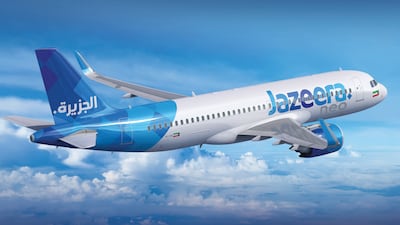Kuwait's Jazeera Airways is in talks with competing engine-makers Pratt & Whitney and its current supplier CFM International for a jet engine order and aims to make a decision by the middle of next year.
The budget airline began preliminary discussions with CFM, a General Electric and Safran joint venture, and Raytheon-owned Pratt & Whitney, but is so far “not happy” with the offers from both manufacturers, Jazeera Airways' chief executive Rohit Ramachandran told The National on Tuesday.
“Discussions will continue and we will use this year and part of next year to ensure we have the right terms,” Mr Ramachandran said.
“We will finalise a decision by mid-2024 … we are hoping for better commercial terms and technical guarantees.”
In January 2022, the airline's board approved a $3.4 billion deal to buy 28 narrow-body aircraft from Airbus after signing a preliminary agreement at the Dubai Airshow in November 2021. The deal included 20 A320 Neos and eight A321 Neos.
The engine manufacturers submitted their bids after Jazeera Airways issued a request for proposals in May 2022.
The discussions come as the aviation industry faces supply chain disruptions that have left suppliers and manufacturers scrambling to source raw materials and keep production moving.
A decision on engines to power the aircraft will need to be made about two years ahead of the jets' scheduled delivery starting in 2026, according to Mr Ramachandran.
The comments came after the low-cost airline on Tuesday posted a record annual profit in 2022 on the back of strong travel demand and cost-control measures.
Net profit surged to 20.1 million Kuwait dinars ($66 million) last year, up 184 per cent from 7.1 million dinars in 2021, as the airline tripled the number of passengers carried to 3.6 million.
Load factors, a measure of how well the airline fills available seats, rose to 77 per cent last year. This has offset a decline in yield, or the average fare paid per passenger, by 35.1 per cent to 47.96 dinars.
The record annual profit came despite a “dramatic” increase in fuel prices that added about 9 million dinars to the airline's costs, Mr Ramachandran said.
The airline posted a fourth-quarter net loss of 700,000 dinars, from 7 million dinar profit in the same period of 2021.
The executive expects the airline's annual net profits in 2023 to exceed last year's record levels.
“We fully expect 2023 to be a significantly better year than 2022 and January is evidence of this view we hold, in terms of every single commercial metric,” he said.
Strong demand, low unit costs, load factors of about 80 per cent, healthy yields and “new and current destinations are expected to shore up a very strong result in the first quarter and for the year in general”.
Jazeera Airways “stands to benefit” from the current global economic conditions because of its low-cost business model and a focus on costs, he added.
“You have people who tighten up discretionary spending and go towards low-cost airlines rather than full-service carriers and in that respect LCCs can stand to benefit in adverse economic conditions,” he said.
“Secondly, we have a very tightly controlled cost structure, so when input costs go up because of higher inflation, we’re in a position to make a profit even with reduced margins.”
The airline group's earnings have also benefitted from revenue from its duty-free business at its own terminal. It also benefitted from its own aviation training organisation that provides it with both a “steady pipeline of talent” and a “great source of revenue” from the students paying for the training, he said.


